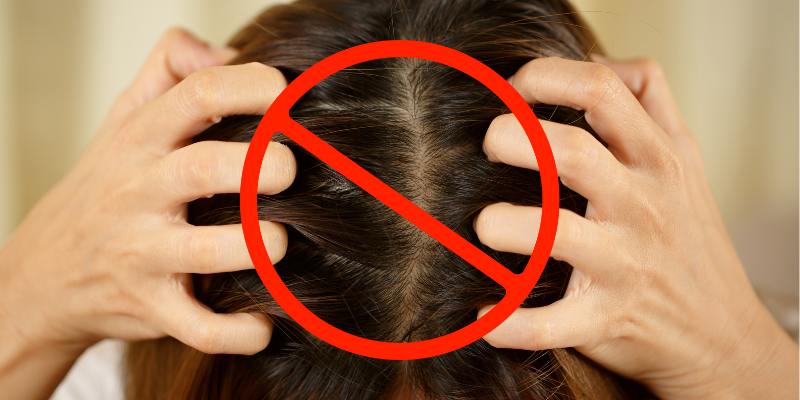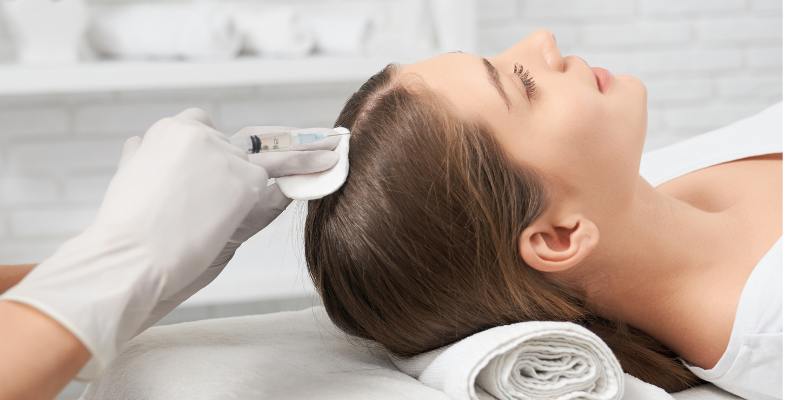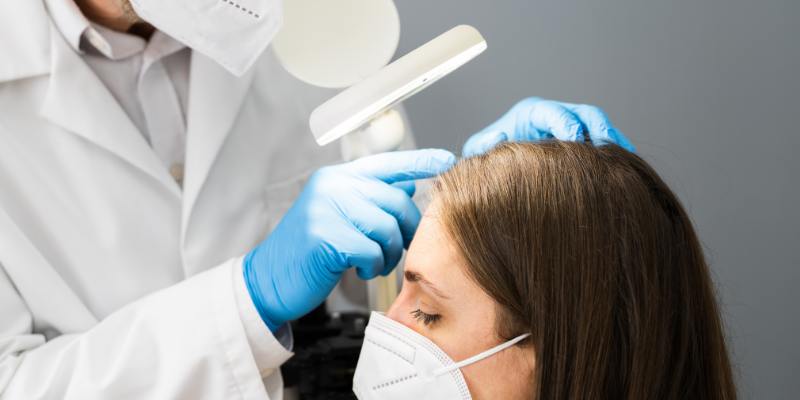A healthy scalp is the foundation for healthy hair.
But what happens when that foundation gets itchy, irritated, and even leads to hair loss?
Itchy scalp and hair loss can be symptoms of various scalp infections.
Let's explore some common culprits and how to restore your scalp to a healthy, happy state.

Scratching the Itch Away? Common Scalp Infections and Their Signs
Having a scalp infection can often cause a lot of distress. The good news is there are plenty of treatments once diagnosed.
Here are the most common types of scalp infections:
- Seborrheic Dermatitis (Seb Derm): This chronic inflammatory condition causes red, itchy, and flaky patches on the scalp, often accompanied by greasy dandruff.
- Tinea Capitis (Scalp Ringworm): A fungal infection highly contagious among children, it presents with itchy, scaly patches, redness, and sometimes even broken hairs.
- Folliculitis: This inflammation of hair follicles can be bacterial or fungal. It causes itchy, red bumps or pustules on the scalp, which can sometimes lead to hair loss if the condition is severe.
- Psoriasis: This autoimmune condition can affect the scalp, causing thick, red, and scaly patches with silvery-white scales. Itching and hair loss can occur in affected areas.
Visiting your local Dermatologist can help diagnose what type of scalp infection you have.
Beyond the Itch: Additional Symptoms to Watch Out For
Additional stress from a scalp infection can make things worse. Having a better understanding of what's going on and to expect is going to help.
While itching is a telltale sign, other symptoms can accompany scalp infections:
- Flaking or scaling: This can range from mild dandruff to thick, crusty patches.
- Redness and inflammation: The scalp might appear red, swollen, or irritated.
- Tenderness or pain: The scalp might be sore to the touch, especially with folliculitis.
- Hair loss: In some cases, severe or untreated infections can lead to temporary or permanent hair loss.

Don't Scratch and Hope! Seeking Help for Scalp Infections
If you're experiencing an itchy scalp and suspect an infection, you must see a doctor or dermatologist for diagnosis and treatment.
Early intervention can prevent complications like permanent hair loss.
Treatment options may include:
- Antifungal medications: These are for fungal infections like ringworms.
- Antibacterial ointments or antibiotics: To combat bacterial folliculitis.
- Medicated shampoos and corticosteroids: To reduce inflammation and itching associated with Seb Derm and psoriasis.
Preventing Scalp Infections: Taking Care of Your Scalp
An ounce of prevention is worth a pound of cure!
Here's how to keep your scalp healthy and prevent infections:
- Maintain good hygiene: Wash your hair regularly with a gentle shampoo, especially after sweating.
- Avoid harsh chemicals and tight hairstyles: These can irritate the scalp and create an environment conducive to infection.
- Manage stress: Stress can exacerbate skin conditions like Seb Derm.
- Eat a balanced diet: Ensure your diet is rich in nutrients that support scalp health, like vitamins A, C, and D.
Remember, Early Action is Key
Hair loss and an itchy scalp can be a nuisance, but they shouldn't be ignored.
By recognizing the signs of common scalp infections and seeking treatment promptly, you can restore your scalp's health and keep your hair growing strong and healthy.

So, ditch the itch and embrace a healthy scalp!
At Wig Medical, we believe hair loss shouldn't define you.
We empower you to reclaim your confidence and rediscover your beauty. Explore our comprehensive wig selections online, schedule a complimentary consultation with a certified specialist today, or contact us to learn more.
Contact a member of our professional team today!
Five Things You Need to Know about Scalp Infections and Hair Loss
Let's jump right into it!
1 - What are the common types of scalp infections that cause hair loss?
Several types of scalp infections can lead to hair loss.
Fungal infections, such as Tinea Capitis (scalp ringworm), are prevalent in children. Bacterial infections, like folliculitis, occur when bacteria infect the hair follicles.
Viral infections, such as herpes zoster (shingles), can affect the scalp and cause painful lesions and temporary hair loss.
2 - How do scalp infections lead to hair loss?
Scalp infections cause inflammation around the hair follicles, disrupting the normal hair growth cycle.
Depending on the severity and type of infection, this can lead to temporary or, in severe cases, permanent hair loss.
For example, fungal infections like Tinea Capitis can result in scarring alopecia if not treated promptly.
3 - What are the symptoms of scalp infections?
Symptoms can vary depending on the type of infection but often include:
- Itching and redness: Most scalp infections cause significant itching and visible redness or irritation.
- Flaking and scaling: Dandruff-like flaking and scaling can occur, often more severe than typical dandruff.
- Pain and tenderness: Infected areas may be painful to the touch, especially in folliculitis or shingles.
- Pustules or blisters: Some infections, like bacterial folliculitis or herpes zoster, can cause pustules or blisters on the scalp.

4 - How are scalp infections diagnosed and treated?
Diagnosis usually involves a visual inspection and may include taking a sample of skin cells or hair for laboratory analysis.
Treatment depends on the type of infection. Fungal infections are treated with antifungal medications, usually in oral form, to reach the hair follicles effectively.
Bacterial infections may require topical or oral antibiotics.
Viral infections benefit from antiviral drugs if treated early in the course of the infection.
Early diagnosis and treatment are critical to prevent permanent hair loss.
5 - Can I wear a cranial prosthesis if I have a scalp infection?
While wearing a cranial prosthesis can help cover hair loss and restore appearance, it's crucial to resolve any active infection first.
Medical wigs and other prostheses can irritate an infected scalp or trap moisture and warmth, potentially worsening the infection.
Once the infection is under control, a properly fitted and breathable cranial prosthesis can be used safely.
Do you want to share your experience or more information? Leave us a note in the comments below!

